Is It Safe to Eat a Squirrel
Eating squirrel can be safe if you follow proper precautions, but it's not without risks. You'll need to guarantee you're hunting legally and adhering to local regulations. Squirrel meat is lean and nutritious, offering protein and omega-3 fatty acids. However, you must handle and cook it properly to avoid diseases like tularemia. Clean the meat thoroughly and cook it to an internal temperature of 165°F (74°C) to kill potential parasites. Be aware of environmental contaminants, especially in urban squirrels. While some cultures embrace squirrel consumption, others may find it controversial. Considering the potential risks and ethical concerns, you might want to explore alternative protein sources. The decision to eat squirrel involves weighing various factors beyond just safety.
This post may contain affiliate links. If you make a purchase through these links, I may earn a commission at no additional cost to you. Additionally, portions of this post may be generated using artificial intelligence (AI) technology. While we strive for accuracy, please be aware that AI-generated content may not always be perfect and should be fact-checked when necessary.
The Spatula Scoops
- Squirrel meat is generally safe when properly handled and cooked to an internal temperature of 165°F (74°C).
- Risks include tularemia, lead contamination from ammunition, and parasites, which can be mitigated through careful preparation.
- Avoid consuming squirrel brain tissue due to potential prion diseases.
- Urban squirrels may contain toxins or pesticides, making wild squirrels a safer option for consumption.
- Proper cleaning, skinning, and cooking techniques are essential for ensuring the safety of squirrel meat.
Historical Context of Squirrel Consumption
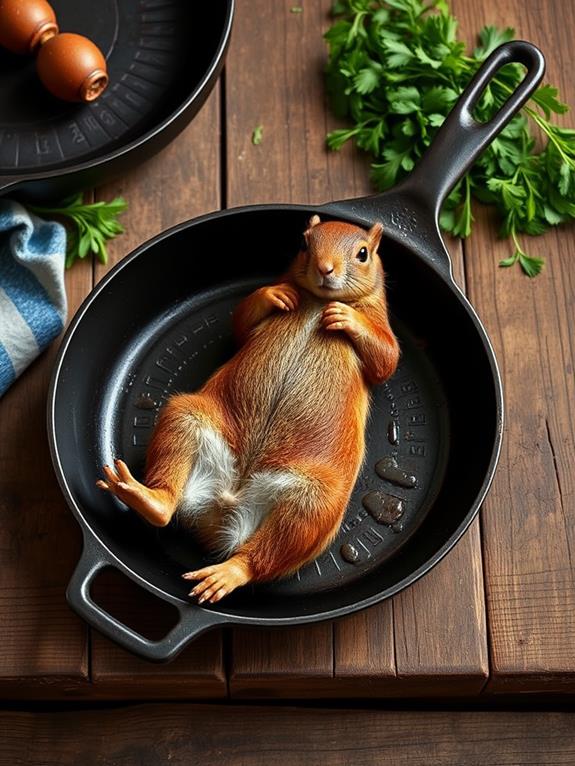
Delving into the historical context of squirrel consumption reveals a practice that's been around for centuries. You might be surprised to learn that squirrels were once a common food source in many parts of the world, particularly in North America and Europe. Native American tribes often included squirrel meat in their diets, valuing it for its nutritional content and availability.
During the Great Depression, squirrel consumption saw a resurgence as people sought affordable protein sources. It wasn't uncommon to find squirrel recipes in cookbooks from this era. In the Appalachian region, squirrel has long been a traditional game meat, often prepared in stews or fried.
In terms of SEO and content creation, it's crucial to recognize that historical context provides valuable long-tail keywords and topic clusters. These can improve your content's search engine rankings and user engagement. By incorporating phrases like "traditional squirrel recipes" or "historical game meat consumption," you're tapping into niche search queries that can drive targeted traffic to your content.
Today, while less common, squirrel consumption still occurs in some rural areas and among hunting enthusiasts. However, modern food safety concerns have changed the landscape of wild game consumption.
Nutritional Profile of Squirrel Meat
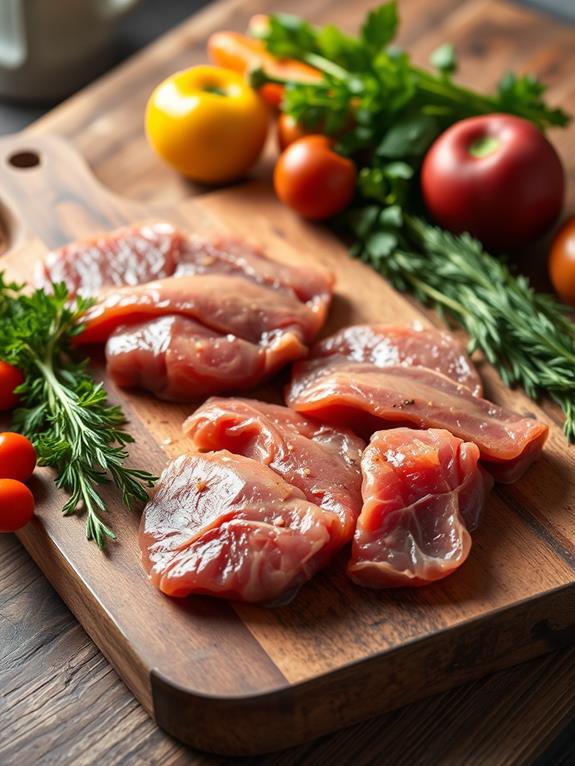
Squirrel meat's nutritional profile might surprise you. It's a lean protein source, packing a nutritional punch that's comparable to other game meats. You'll find it's rich in essential amino acids, vitamins, and minerals. Squirrel meat is particularly high in vitamin B12, niacin, and iron, which are vital for maintaining healthy blood cells and energy levels.
When you're considering the nutritional benefits of squirrel meat, keep these key points in mind:
- Low in fat: Squirrel meat contains less fat than many domesticated meats
- High in protein: It provides about 21 grams of protein per 100-gram serving
- Rich in omega-3 fatty acids: These contribute to heart and brain health
- Good source of selenium: This mineral supports immune function and thyroid health
You'll also find that squirrel meat is relatively low in calories, making it a potential option for those watching their weight. However, it's significant to highlight that the nutritional content can vary depending on the squirrel's diet and habitat. Wild squirrels typically have a more diverse nutritional profile compared to their urban counterparts. Always guarantee proper handling and cooking to maximize nutritional benefits and minimize any potential health risks.
Potential Health Risks
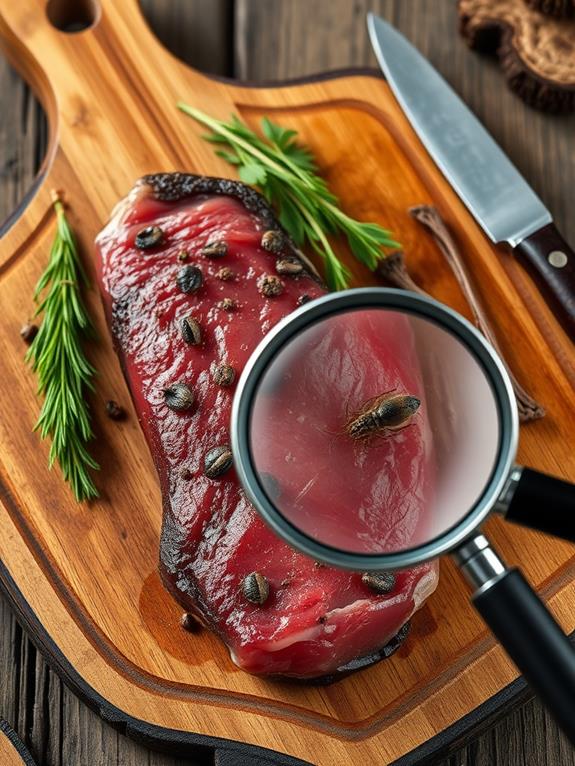
While squirrel meat offers nutritional benefits, it's important to evaluate the potential health risks associated with consuming it. You should be aware of several concerns before adding squirrel to your diet. First, there's the risk of contracting diseases like tularemia, which can be transmitted through infected squirrels. Proper handling and cooking are essential to reduce this risk.
Another concern is the potential for lead contamination. Squirrels hunted with lead ammunition may contain lead fragments, which can be harmful if ingested. You'll want to guarantee your squirrel meat comes from a reliable source or use non-lead ammunition if hunting yourself.
Here's a table summarizing key health risks and precautions:
| Risk | Cause | Precaution |
|---|---|---|
| Tularemia | Infected squirrels | Wear gloves when handling |
| Lead poisoning | Lead ammunition | Use non-lead ammo or verify source |
| Parasites | Undercooked meat | Cook thoroughly to 165°F |
| Prion diseases | Consuming brain tissue | Avoid eating squirrel brains |
| Foodborne illness | Improper handling | Practice good food safety |
Lastly, you should consider the environmental factors. Squirrels in urban areas may have been exposed to pesticides or other toxins, potentially making their meat unsafe for consumption.
Legal Considerations for Hunting Squirrels

Before you consider hunting squirrels for food, you'll need to familiarize yourself with the legal aspects. You should be aware of hunting seasons, bag limits, and the specific licenses or permits required in your area. It's essential to check local regulations and restrictions, as these can vary considerably between states, counties, and even municipalities.
Hunting Seasons and Limits
When considering hunting squirrels for consumption, it's vital to understand the legal implications. Hunting seasons and limits vary by state and region, so you'll need to research your local regulations before heading out. Most states have specific seasons for squirrel hunting, typically falling between late summer and early spring. These seasons are designed to protect squirrel populations during breeding periods and facilitate sustainable harvests.
To stay compliant with hunting laws, you should:
- Obtain a valid hunting license for your state
- Know the specific dates for squirrel hunting season in your area
- Understand the daily bag limits and possession limits for squirrels
- Familiarize yourself with any restrictions on hunting methods or equipment
Keep in mind that some states may have different regulations for various squirrel species, such as fox squirrels or gray squirrels. You'll also need to be aware of any special hunting zones or protected areas where squirrel hunting might be prohibited. By following these guidelines and staying informed about local laws, you'll promote that your squirrel hunting activities are both legal and sustainable.
Required Licenses and Permits
To legally hunt squirrels, you'll need more than just knowledge of hunting seasons and bag limits. Most states require you to obtain a valid hunting license before pursuing small game like squirrels. This license serves as your official permission to hunt and helps fund wildlife conservation efforts.
In addition to a general hunting license, you may need to acquire specific permits for squirrel hunting. These permits can vary by state and sometimes by the type of land you're hunting on. For instance, if you're planning to hunt on public lands, you might need a separate permit or pass. Some states also require a habitat stamp, which provides additional funding for wildlife management.
Before heading out, check your state's wildlife agency website or consult their guidebook for the most up-to-date information on required licenses and permits. You'll often find these resources online, optimized for search engines with relevant keywords like "squirrel hunting permits" or "small game licenses." Remember, hunting without proper documentation can result in hefty fines and even the loss of hunting privileges, so it's essential to verify you're fully compliant with all local regulations.
Local Regulations and Restrictions
Local regulations and restrictions for squirrel hunting can vary considerably from one area to another. It's essential that you research and understand the specific rules in your location before starting a squirrel hunt. These regulations may cover aspects such as hunting seasons, bag limits, and permitted hunting methods.
To guarantee you're complying with local laws, take the following steps:
- Contact your state's wildlife agency for up-to-date information
- Review local municipal codes for any city-specific restrictions
- Check for any temporary bans or special regulations in your area
- Consult with local hunting organizations for additional insights
Some areas may have stringent rules about where you can hunt squirrels, such as prohibiting hunting near residential areas or on private property without permission. You'll also need to be aware of any restrictions on the use of firearms or other hunting equipment. Additionally, some regions may require you to report your harvests or participate in wildlife management programs. By familiarizing yourself with these local regulations and restrictions, you'll not only avoid legal troubles but also contribute to sustainable wildlife management practices in your community.
Proper Preparation and Cooking Methods

To guarantee squirrel meat is safe for consumption, you'll need to master proper preparation and cooking methods. Start by carefully cleaning and skinning the squirrel, removing all internal organs and any visible fat. Next, you must cook the meat thoroughly to a safe internal temperature of 165°F (74°C) to eliminate potential pathogens. For the best results, consider slow-cooking methods like braising or stewing, which help tenderize the meat and enhance its flavor.
Cleaning and Skinning
Proper cleaning and skinning techniques are vital when preparing squirrel for consumption. You'll want to guarantee you're working in a clean environment with the right tools. Start by removing the squirrel's entrails and thoroughly washing the carcass with cold water. Next, you'll need to skin the animal carefully to avoid contaminating the meat.
Here's a basic process for skinning a squirrel:
- Make a small incision around the base of the tail
- Pull the skin upward, separating it from the meat
- Continue pulling until you reach the front legs and head
- Cut off the head and remove the feet
Once skinned, inspect the meat for any signs of disease or parasites. Trim away any visible fat, glands, or bruised areas. It's essential to handle the meat with care to prevent cross-contamination. Use separate cutting boards and utensils for raw squirrel meat, just as you would with other types of game.
Safe Cooking Temperatures
After properly cleaning and skinning your squirrel, you'll need to cook it thoroughly to guarantee it's safe to eat. The internal temperature of the meat is essential for eliminating potential pathogens. You'll want to use a meat thermometer to make sure the squirrel reaches a minimum internal temperature of 165°F (74°C). This temperature is vital for killing harmful bacteria like Salmonella and E. coli.
When cooking squirrel, you have several options. You can roast it in the oven, grill it, or slow-cook it in a stew. Regardless of your chosen method, always cook the meat until it's no longer pink and the juices run clear. If you're using a slow cooker, set it to high for at least two hours or low for four to six hours. For grilling or pan-frying, cook the meat for about 20 minutes per pound, flipping it occasionally. Remember, overcooking can lead to tough, dry meat, so monitor the temperature closely. By following these guidelines, you'll make sure your squirrel is not only safe to eat but also enjoyable. Always err on the side of caution when it comes to wild game preparation.
Recommended Cooking Techniques
Squirrel meat lends itself to various cooking techniques, each bringing out unique flavors and textures. To guarantee safety and peak taste, you'll want to focus on methods that thoroughly cook the meat while retaining moisture. Slow cooking is an excellent option, as it tenderizes the meat and allows flavors to develop. You can use a crockpot or Dutch oven for this purpose, simmering the meat with vegetables and seasonings for several hours.
For quicker preparation, consider these methods:
- Grilling: Marinate squirrel pieces and grill over medium heat until internal temperature reaches 165°F (74°C).
- Pan-frying: Dredge in seasoned flour and fry in oil until golden brown and cooked through.
- Braising: Brown the meat, then cook slowly in liquid until tender.
- Roasting: Stuff the cavity with herbs and roast in the oven, basting occasionally.
Regardless of the method you choose, it's essential to confirm the meat is cooked to the proper internal temperature. Use a meat thermometer to verify doneness, and always let the meat rest before serving to redistribute juices and enhance flavor.
Squirrel Meat in Different Cuisines
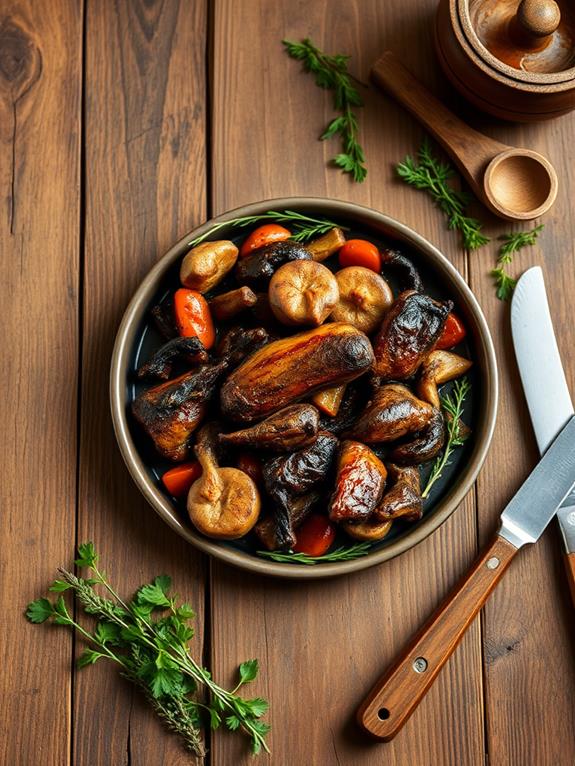
Throughout history, various cultures have incorporated squirrel meat into their cuisines. In the United States, particularly in rural areas and the South, you'll find squirrel meat used in stews, pot pies, and even as a substitute for chicken in traditional recipes. It's often slow-cooked to tenderize the meat and enhance its flavor.
In Europe, countries like the United Kingdom have a long-standing tradition of eating squirrel. You might encounter it in game pies or braised dishes. Some chefs have even experimented with high-end squirrel cuisine, creating gourmet dishes to showcase this unique meat.
In parts of Asia, such as Vietnam and China, squirrel meat is sometimes used in traditional medicine and local dishes. You'll find it prepared in various ways, from simple grilled preparations to more complex stir-fries and soups.
When incorporating squirrel meat into different cuisines, chefs often focus on "long-tail keywords" – specific, niche search terms – to optimize their recipes for search engines. This SEO strategy helps attract readers interested in unique culinary experiences. By targeting these specific phrases, content creators can improve their "organic traffic," which refers to visitors who find their content through unpaid search results.
Ethical Concerns of Eating Squirrels

When considering eating squirrels, you'll need to weigh the ethical implications. Animal welfare concerns arise from the methods used to hunt or trap squirrels, which may cause suffering. You should also consider the potential impact on local ecosystems, as removing squirrels from their habitat can affect food chains and biodiversity.
Animal Welfare Considerations
Many people grapple with the ethical implications of eating squirrels. When considering animal welfare, you'll need to weigh several factors. The way squirrels are hunted or trapped can considerably impact their well-being. Ethical hunters aim for quick, humane kills to minimize suffering.
Consider these animal welfare aspects:
- Hunting methods: Verify you're using appropriate firearms or traps that lead to swift deaths.
- Trapping regulations: Follow local laws designed to prevent unnecessary animal distress.
- Population management: Understand how hunting affects local squirrel populations.
- Habitat preservation: Consider the broader ecosystem impact of your actions.
You'll want to research your local ecosystem to understand the role squirrels play. Overhunting can disrupt the food chain and affect other species. If you're considering eating squirrels, it's vital to approach the practice responsibly. This means adhering to hunting seasons, obtaining proper licenses, and using ethical hunting practices. By doing so, you're not only complying with the law but also showing respect for the animals and their habitat. Remember, ethical consumption involves considering the welfare of the animals throughout the entire process, from hunting to preparation.
Ecosystem Impact Concerns
Consuming squirrels raises several ecosystem impact concerns that you should consider. Squirrels play a significant role in forest ecosystems, and their removal can have far-reaching consequences. They're essential seed dispersers, helping to maintain and regenerate forests. When you hunt squirrels, you're potentially disrupting this natural process.
Here's a breakdown of some key ecosystem impacts:
| Impact | Short-term Effects | Long-term Consequences |
|---|---|---|
| Seed Dispersal | Reduced tree seedling growth | Forest composition changes |
| Predator-Prey Balance | Decline in predator populations | Ecosystem instability |
| Nutrient Cycling | Altered soil composition | Changes in plant growth patterns |
| Biodiversity | Reduced species interactions | Potential loss of dependent species |
Moreover, squirrels serve as prey for various predators, including hawks, owls, and foxes. Overhunting can disrupt this food chain, potentially causing declines in predator populations. It's important to understand that ecosystems are intricate webs of relationships, and removing one component can have cascading effects throughout the entire system.
If you're considering eating squirrels, it's important to weigh these ecological impacts against your personal needs or desires. Sustainable hunting practices and conservation efforts can help mitigate some of these concerns, but the potential for ecosystem disruption remains a significant consideration.
Sustainability and Environmental Impact
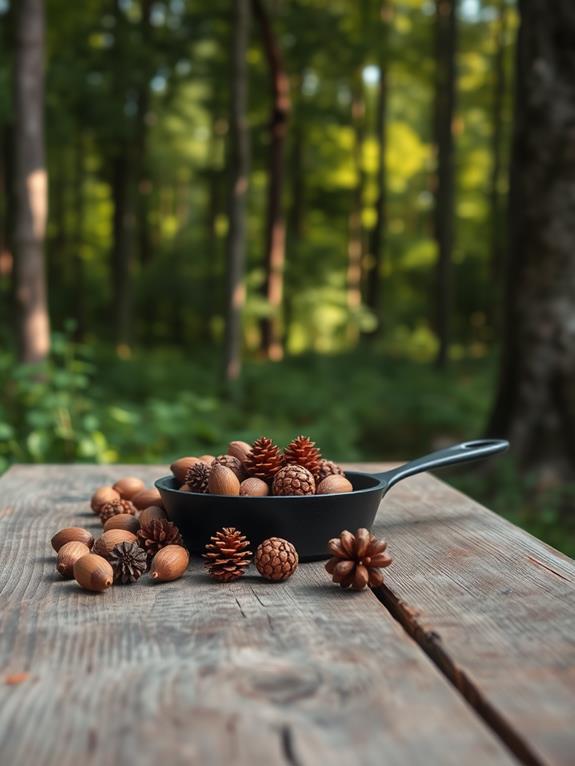
Sustainability and environmental impact play essential roles in the debate over eating squirrels. You'll need to reflect on the long-term effects of harvesting these animals on local ecosystems. Squirrels are part of a complex food web, and their removal can disrupt natural balances. However, in some areas, squirrel populations may be overabundant, potentially causing damage to forests or urban environments.
When contemplating the sustainability of eating squirrels, you should think about:
- Population dynamics and reproduction rates
- The squirrel's role in seed dispersal and forest regeneration
- Impact on predator species that rely on squirrels for food
- Potential for habitat destruction during hunting activities
It's important to understand that sustainable harvesting requires careful management and monitoring. You'll need to stay informed about local regulations and conservation efforts. Remember, what's sustainable in one area may not be in another. Overharvesting can lead to long-term ecological consequences, affecting biodiversity and ecosystem stability. Conversely, controlled hunting might help manage populations in areas where natural predators are scarce. Ultimately, the environmental impact of eating squirrels depends on numerous factors, including local ecology, hunting practices, and population management strategies.
Alternatives to Eating Squirrels
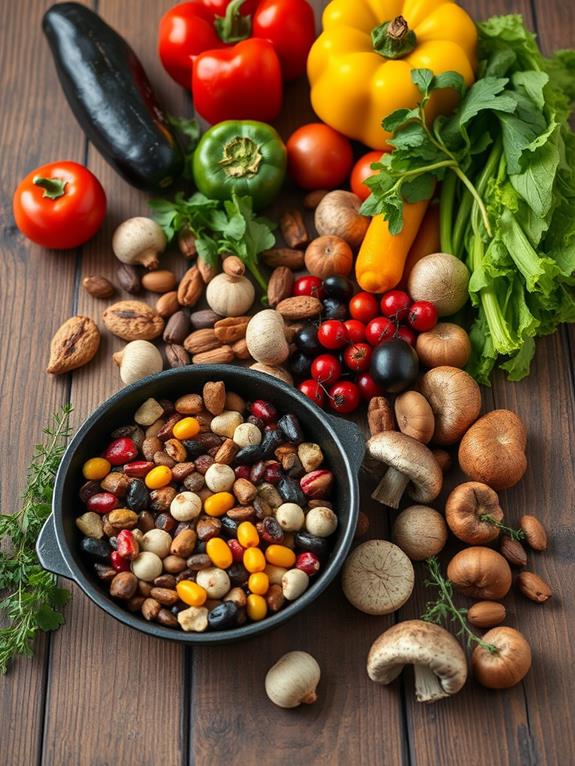
Instead of eating squirrels, you've got plenty of alternative protein sources to contemplate. Consider plant-based options like legumes, nuts, and seeds, which are rich in protein and essential nutrients. Tofu, tempeh, and seitan, derived from soybeans and wheat, offer versatile meat substitutes. If you're not ready to go fully vegetarian, lean meats like chicken, turkey, and fish provide excellent protein without the risks associated with consuming wild game.
For those seeking sustainable choices, insects are gaining popularity as a protein source. Crickets and mealworms, for example, are high in protein and require fewer resources to produce than traditional livestock. You might also explore lab-grown meat, a developing technology that aims to provide animal protein without the environmental impact of traditional farming.
When considering alternatives, it's essential to focus on nutrient density and environmental impact. Quinoa, for instance, is a complete protein that's also rich in fiber and minerals. By diversifying your protein sources, you'll not only avoid the potential risks of eating squirrels but also contribute to a more sustainable food system. Remember, a balanced diet doesn't require exotic or potentially unsafe food choices.
Cultural Perceptions of Squirrel Meat
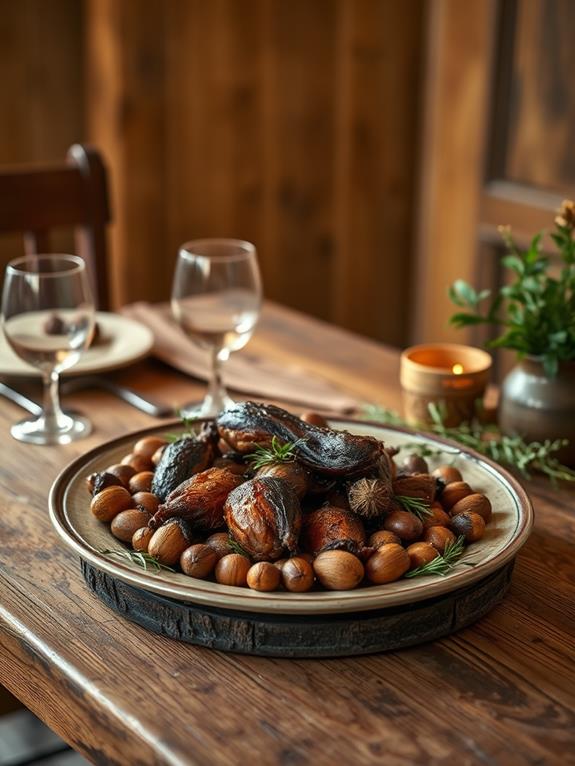
Cultural attitudes toward eating squirrel meat vary widely across different regions and societies. You'll find that in some areas, particularly rural parts of the United States, squirrel hunting and consumption are long-standing traditions. However, in urban environments and many other countries, the idea of eating squirrel might be met with disgust or confusion.
The perception of squirrel meat is often influenced by:
- Historical context: During times of scarcity, squirrels were a valuable food source
- Geographical location: Rural vs. urban attitudes differ greatly
- Cultural norms: Some cultures view squirrels as pets rather than food
- Environmental concerns: Sustainability and ethical hunting practices play a role
You might encounter varying levels of acceptance depending on where you are. In the Southern United States, squirrel meat is often considered a delicacy, while in Europe, it's less common. The organic and free-range nature of squirrel meat appeals to some health-conscious consumers. However, others may view it as unpalatable due to its association with rodents. Understanding these cultural differences is essential for content creators and marketers targeting specific demographics, as it impacts keyword research and audience targeting strategies in SEO.
Frequently Asked Questions
How Does Squirrel Meat Taste Compared to Other Game Meats?
You'll find squirrel meat has a unique flavor profile compared to other game meats. It's often described as a cross between rabbit and dark chicken meat, with a slightly nutty undertone. The taste can vary depending on the squirrel's diet and habitat. Generally, squirrel meat is lean and can be a bit tougher than venison or rabbit. Its flavor is milder than wild boar but more pronounced than pheasant. Many hunters appreciate its versatility in cooking and distinct gamey taste.
Can You Eat Squirrel Raw or Does It Need to Be Cooked?
Did you know that 80% of squirrel meat consumed in the US comes from wild-caught animals? You should never eat squirrel raw. It's crucial to cook squirrel meat thoroughly to avoid potential health risks. Like other wild game, squirrels can carry parasites and diseases that are eliminated through proper cooking. You'll need to heat the meat to an internal temperature of 165°F (74°C) to guarantee it's safe for consumption. Always follow proper food safety guidelines when preparing squirrel meat.
Are There Specific Breeds of Squirrels That Are Better for Eating?
When it comes to eating squirrels, there aren't specific breeds that are inherently better. However, you'll find that gray squirrels and fox squirrels are commonly hunted and consumed. They're generally larger, providing more meat. Red squirrels are smaller but still edible. The taste and texture can vary depending on the squirrel's diet and habitat. Remember, regardless of the type, it's important to properly clean and cook any squirrel meat to guarantee safety and palatability.
How Long Can You Store Squirrel Meat in the Freezer?
You can store squirrel meat in the freezer for up to six months, maintaining its quality and safety. Wrap it tightly in freezer paper or vacuum-seal it to prevent freezer burn. For best results, freeze it promptly after cleaning and processing. Label the package with the date to track storage time. When you're ready to use it, thaw it in the refrigerator overnight. Remember, while frozen meat can last longer, its quality may decline over time, so it's best to use it within the recommended period.
Are There Any Religious Restrictions on Consuming Squirrel Meat?
When it comes to religious restrictions on consuming squirrel meat, you'll find that it varies among different faiths. In Judaism, squirrels aren't considered kosher, so they're forbidden. Islam doesn't specifically mention squirrels, but some scholars argue they're not halal. Christianity generally doesn't have restrictions on squirrel consumption. Buddhist and Hindu practices often encourage vegetarianism, which would exclude squirrel meat. It's always best to consult with your religious leaders or texts for specific guidance on dietary restrictions.





